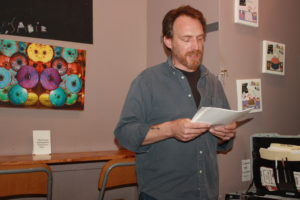Among the nicest gifts I received this year were two heartfelt appraisals of my poetry books by Marc Schuster of Small Press Reviews. Many critics love to show off their smarts, but not so many share their real feelings as he does. I remain grateful for what he wrote. In turn let me recommend his comic novel, The Singular Exploits of Wonder Mom & Party Girl, an entertainment that I raced through in several days of delight. It’s the tale of the good suburban mother everyone would admire, divorced but cheerful in her responsibilities to her children, her career, and her volunteer commitments, who succumbs to the devilish allure of cocaine and party time. Haven’t we all felt that urge? I remember, sort of, spring term of senior year in prep school when I skipped out on lacrosse to join the long hairs on their afternoon forays to the nearby cemetery, a stately green preserve as historic as our New England boarding school, where we idled away the hours smoking joints and playing Frisbee golf using the tallest headstones as our targets. In hindsight, I see that I was finally rebelling against the pressures of being such a good student, though I’d waited until I was accepted by the college of my choice. Now I had spring fever. All winter I’d pulled all-nighters as the school yearbook editor. I’d had my heart broken over my first great crush. I’d finished my senior thesis on Norman Mailer who was nothing if not a little crazy himself. It felt like a liberation to get away from my studiousness and my subscription to the New York Review of Books to join the stoners who hung out in the dorm smoking room with hash-spiked cigarettes under the watchful presence of the blue sailor face from Zig-Zag rolling papers painted large by one of us on the wall. At night we trundled down the basement stairs with our set of stolen keys to raid the school kitchen freezer for a five-pound brown bucket of ice cream stamped U.S. Government Surplus on its side to satisfy our munchies. But I digress, a habit developed independently of marijuana. In the long run my stint as a pothead was brief but probably helpful in getting me off the path of the tried and true. Certainly, having grown up in the suburbs, I’ve never gone back, first choosing the city after college, then the country. The mores of suburbia are part of the comedy of The Singular Exploits of Wonder Mom & Party Girl, a first novel published by Permanent Press. Never heard of it? Neither had I until I discovered Marc Schuster at his web site. Which brings me to my point.
Several years ago in Albany for a poetry reading at the start of the holiday shopping season, I picked up the local weekly, Metroland, and was impressed by the “Buy Local” emphasis in both the ads and articles. Who could disagree? Long before the housing bubble collapsed, the bargain chains at the mall began hollowing out our town centers and middle class economy as the wealth once shared among us got funneled up corporate chutes to the Wal-Mart heirs and other one percenters. “Buy Local” is a friendly way to support an economy for the rest of us. And the biggest advertiser in the “Buy Local” issue, I was glad to see as an author, was Albany’s largest independent bookstore, The Book House. Yet the irony that didn’t escape me was that every book pictured in the ad had been published by Vintage or Knopf or Penguin or another of the imprints of the Big Six publishers that fill the shelves at the independents as well as at Barnes & Noble. “Buy Local” yes. But why not “Read Local” too? I wish that the enthusiasm so many people share for local businesses and independent enterprises could find its way to books. Not that the Big Six don’t give us gems. But they didn’t publish The Singular Exploits of Wonder Mom & Party Girl. They published precious few of the dozens of fine books I’ve blogged about this year. They haven’t published me. In fact, you couldn’t venture much farther from corporate publishing than Michael and Carolyn Czarnecki of FootHills Publishing who printed and hand-stitched my poetry collections along with many others at their house tucked beyond hilltop hay fields and surrounded by Amish neighbors in western New York State. If there was such a thing as an organic book, these people would make it. They publish poetry because they love it. There are no shareholders involved, only poets and their readers.
So let this be my plea to consider my books in particular and small press books in general for your holiday gift giving. Of course, you should only buy books that you think you and your friends will enjoy, so I’ll give Marc Schuster the final word.
From April 8, 2011:
In My Late Mother as a Ruffed Grouse, Will Nixon offers a collection of poetry that vividly recalls the suburbia of his youth and traces the trajectory of innocence to experience. Throughout, Nixon meditates on the minute, hidden, secret details that make up a life: the “loose teeth that became nickles,” the crawlspace beneath his mother’s bedroom, the coins laid out on railroad tracks. From here, he takes us on a journey through young adulthood — a “first rubber,” the poet sipping sherry with his mother in his late teens (her valiant attempt to inoculate him against the temptations of harder mind-altering substances), college, sex, drugs, snorkeling, and television (not necessarily in that order). And at the far end of the spectrum (not to mention the other end of a life), we find the poet meditating on pollution, golf balls, life, death, and reincarnation. Thematically, the collection echoes such small press works of fiction as Kermit Moyer’s The Chester Chronicles and poetry collections as Anthony Buccino’s American Boy Pushing Sixty. All told, a detailed and loving vision of life in all of its stages.
From July 15, 2011:
I know better to conflate the poet and the poem, the writer and his creations, but I want to believe that the “I” of the poetry collected in Will Nixon’s Love in the City of Grudgesis, indeed, the poet, for his “I” is honest and forthright about a time in his life that was, in retrospect, magical but which appeared, in the heat of the long summer moment, to be the deadest of ends. I could be friends with that “I,” in that time and place.
The collection is about being young and poor and in love and wanting to be a writer and not knowing what to say because you don’t yet realize that all that lies before you is plenty to say. It’s about promise. It’s about potential. It’s about living in Hoboken and naming your cats Sid and Nancy because you wish you were more of a punk. It’s about dreams. It’s about fitting in. It’s about cockroaches and survival. And, towards the end, it’s about zombies.
Throughout the volume, Nixon dazzles with his attention to detail, bringing the worlds of his squandered youth to life with images as precise as they are telling: the hapless brother who “unscrews Oreos for the cream,” the unfinished copy of Gravity’s Rainbow (“All summer, I couldn’t get past his octopus/with Pavlovian training”), the rubber masks of Nixon and Reagan, the Hefty bag of laundry, the chocolate syrup masquerading as blood in Night of the Living Dead.
All told, it’s a strong and moving collection that bespeaks the myriad ways in which the past and the present, not to mention the living and the dead, are always closer to each other than we might care to admit.





